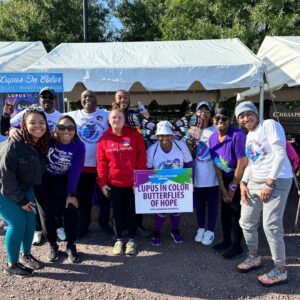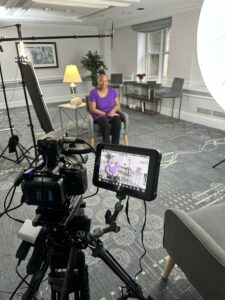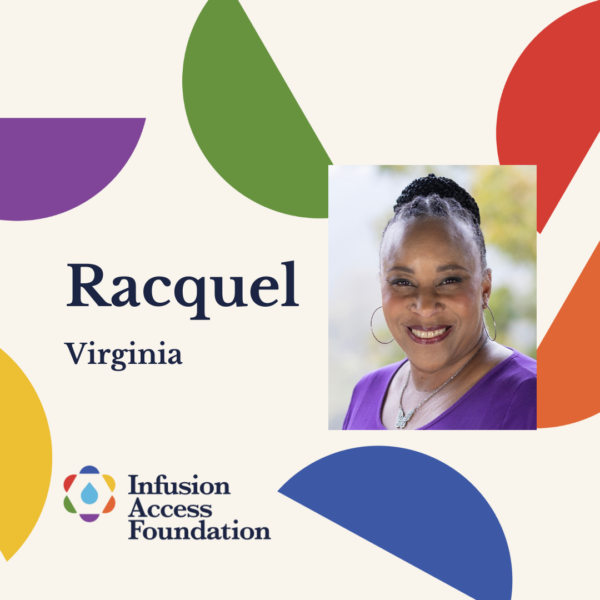When Racquel Dozier first began feeling ill, she had no idea how much persistence and resilience it would take for her to access treatment. What she did know, even in the uncertainty, was that her life was about to change—and that she would need to become her own fiercest advocate.
Diagnosis and Access Issues
“I was sick for a year before my first diagnosis. Two years from my second diagnosis, and about three years from my third,” she recalls. “When receiving all of my diagnoses, I was filled with so many different emotions. I was scared, confused, angry and finally relieved that I finally knew what was going on.”
Racquel has demonstrated courage at every stage when confronted with a broken system. She’s navigated the exhaustion and turmoil of step therapy, a bureaucratic process that requires patients to “fail-first” on lesser treatments before accessing a provider’s original prescription.
Several appeals, insurance conversations, and denials meant it took a while to get on the right treatment for her conditions, and ultimately delayed her healing. “The past denial of medications definitely caused stress and anxiety. Some medications were denied or priced so astronomically that I had to find help through nonprofit organizations.”
Even outside of access issues, other obstacles were daunting. Painful side effects, body changes, and decreased treatment effectiveness posed challenges. She also faced a deeper systemic issue: racial exclusion in medical research. “As a Black woman, most treatments have not been in trial or studied for my body and ethnic group. The fear of being that guinea pig has been a problem based on the history of negative trial experiments with the Black population,” she says.

Community and Advocacy
Racquel receives infusions at a hospital and uses the time to reflect. She says, “I like going in for the infusion because it keeps me humble and reminds me that I am able to do hard things with gratitude.” Still, she wishes infusion spaces were warmer and more calming. “I don’t like my actual infusion setting because it has a cold aesthetic to it with just chairs and poles. No calming energy to help through the difficult moments of taking infusions. I also don’t like the amount of time and the tiredness that can come with each infusion every month,” she notes.
As an advocate, educator, and community builder, Racquel uses her story to encourage change. “Working with organizations like the Infusion Access Foundation has helped to broaden my advocacy and health journey. Providing a way to increase awareness and empathy with policymakers and insurance companies is important to me. Making ways to network with other chronic illness thrivers also helps in making sure I don’t feel alone on my own journey and provides a sense of unity in advocating for myself and others,” she says.
Moving forward, she hopes organizations will help to increase awareness and understanding through education. “There are implicit biases that create many treatment issues. Once advocacy organizations begin to educate and understand these issues, it can dramatically help,” she notes.
Racquel’s background as an athlete on the move starkly contrasted with her reality when she was at her worst. She faced near-death experiences, was hospitalized repeatedly, and couldn’t walk. But with effective treatment, things shifted. “With the right treatment I have been able to have some semblance of a healthy life beyond the diseases my body bears. My symptoms are less and when they do come they are not as difficult to handle. My new normal is coping well with the issues with proper treatment and lifestyle changes,” she reflects.

Advice for Other Patients
She says mental health support has played the most significant role in her recovery. Though anxiety and depression can take hold when she’s dealing with pain all of the time, “faith, breathwork, working out, meditation, prayer, and dealing with all issues head-on have been helpful,” she notes.
To other patients, her advice is clear, heartfelt, and supportive: “You are stronger than your illness will allow you to believe, and you can get through the difficult times. I want other patients to see their potential of being well beyond being sick to create a normal that is empowering to their everyday living.” She encourages patients to be patient with themselves, learn about their condition, and listen to their bodies. When it all feels overwhelming, she says: “Take some deep breaths and remember you have made it 100% of the time you thought would kill you.”
Advocacy for others is central to Racquel’s purpose and has enabled her to continue her work over the years. She states: “I am sharing my story because I know that someone can be helped by it. Too many times we feel isolated on our chronic illness journey. When we are able to see someone that has either gone through the same or overcome something similar we can feel less alone. We are then able to tap into our own power to overcome our pain.”
Racquel Dozier’s story is not just about surviving illness or life’s challenges. It’s about transforming pain into empowerment and using that power to uplift others. To share your story and make an impact, connect with us at the Infusion Access Foundation.






